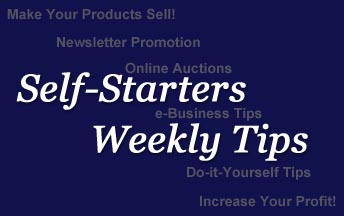
|
Learn the difference between |
Business Email
by
Lynn Terry © 2004 If
you manage your business through the internet full-time, it goes
without saying that you may never meet the majority your clients,
vendors or business partners in person. Most of your correspondence
will be via Email, if not all. Let me share with you some practical
email correspondence tips that I use every day in my own online
business:
If you have a question, or are not entirely sure on any point, email the other party. This goes for your clients and their projects, vendors, merchants, potential business partners, or anyone that you come in contact with - period. If a thought or question crosses your mind... send that email right then and there! Also be sure to send testimonials on products or services you have purchased. Not only can you gain exposure through this (as the merchant may choose to publish your testimonial and signature on their website), but you are also opening the lines of communication with another business owner. This is the first step to developing a relationship with potential joint venture partners and peers that may stand to play a part in the success of your own business. A perfect example would be my own partnership with Andre Chaperon. I just happened to be browsing my discussion forum when Andre registered as a new member. I brought up his profile, as I like to get an idea of members' interests and skill level so that I can best meet their needs. His website address piqued my interest and so I clicked through. Right then and there, I sent Andre an email. Mind you, I don’t personally email ALL new forum members... but I do make it a point to send a message when someone catches my interest. I sent a simple note, welcoming Andre to the forum and also sharing my positive comments on his website. Andre sent a response right away - the first of many emails we would exchange in the coming months. Over the course of the first week, he shared an idea with me that I found very interesting... and we decided to work together to launch a unique success-driven membership portal. Andre and I now work together on a daily basis as the co-owners of TIID. I am glad that I decided to send that first email to Andre several months ago, but knowing Andre - if I hadn’t, he would have ;)
While it's true that you should 'Keep it Simple', it's important to convey your message with clarity and also compel the recipient to respond. You want your message to be personal and meaningful. Address them by name, include your reference to them (ie: "I found your website on Google" or "I was referred to your site by ___"), and then state your specific questions or comments. You should also put some consideration into your Subject line. Write something relevant to your message that will catch the recipients attention. For example, "Hi" could easily be mistaken for junk email and be deleted without having been opened. Instead, include a reference that they will recognize, such as "Interested in your Copywriting Course". Also
be sure to include a full Signature at the end of your message.
At the very least, this needs to be your name and website address
- but may also include your tag line, physical location and telephone
number.
Intentions are not always easy to determine from Plain Text alone. What may appear to you as a crass comment, or an indirect insult, may not be what the sender intended at all. Your first reaction to anything that seems negative is usually *not* the best reaction to share with that person ;) As an example, I was corresponding frequently with someone awhile back that always replied with very short one-liners (and usually zero punctuation). If he initiated the email, there was usually no subject line at all. My impression of this person wasn’t the greatest, as you can imagine. I later had the opportunity to meet him in person at a Seminar and found out that he uses a small email pager, which he carries with him everywhere, to stay connected to his email. Immediately I realized that this was the source of the short messages from this person - he was obviously replying from this small limiting device during the course of his busy schedule. From that point forward, I didn’t regard his one-liners as 'rude', but rather appreciated that he responded right away and with the answer I needed. My point with this is that you never know the situation on the other end of the line... so keep an open mind! If you receive an email that seems 'negative' to you, stop and imagine the sender smiling when they wrote it - - and then read it again. Is it possible that their words are not as negative as they first appeared? Of course, sometimes its downright obvious that the sender is upset, unhappy or just plain rude. In these cases, I always wait before sending a reply. As I mentioned above, your first reaction to something like this is usually *not* the best reaction to share! Come back to that email at a later time and you'll find that it doesn’t invoke such a strong reaction the second time around. Respond positively, and offer a solution to their problem. In the case of complaints, I always make it a point to say, "I appreciate you pointing this out to me" in my response. Identify yourself. Be professional. Convey your message with clarity. Ask questions that initiate further discussion. ...
and use this tool to develop relationships that could have
About the Author - Lynn
Terry, Self-Starters Weekly Tips |
|
| [ Weekly eBiz News | Article Archives | Business Articles | Marketing Articles ]
|